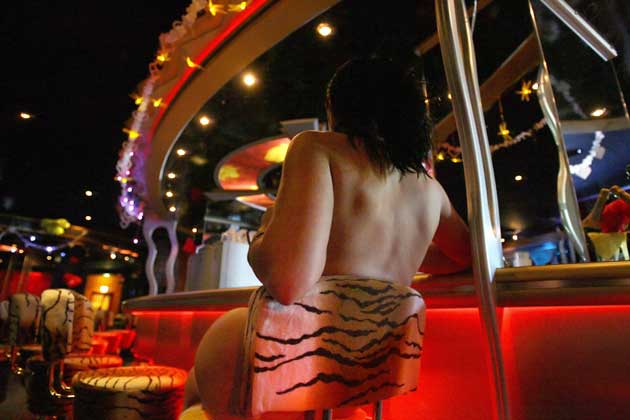Brothels cut prices to beat the recession
German prostitutes are offering discounts, loyalty cards and 'extras'

Your support helps us to tell the story
From reproductive rights to climate change to Big Tech, The Independent is on the ground when the story is developing. Whether it's investigating the financials of Elon Musk's pro-Trump PAC or producing our latest documentary, 'The A Word', which shines a light on the American women fighting for reproductive rights, we know how important it is to parse out the facts from the messaging.
At such a critical moment in US history, we need reporters on the ground. Your donation allows us to keep sending journalists to speak to both sides of the story.
The Independent is trusted by Americans across the entire political spectrum. And unlike many other quality news outlets, we choose not to lock Americans out of our reporting and analysis with paywalls. We believe quality journalism should be available to everyone, paid for by those who can afford it.
Your support makes all the difference.It has not taken long for the global financial crisis to affect the world's oldest profession in Germany.
In one of the few countries where prostitution is legal, the industry has responded with an economic stimulus package of its own: modern marketing tools, rebates, discounts and gimmicks to boost falling demand.
Some brothels have cut prices or added free promotions, while others have introduced all-inclusive flat-rate fees. Free shuttle buses, discounts for seniors and taxi drivers, as well as "day passes" are among marketing strategies designed to keep business going.
"Times are tough for us too," said Karin Ahrens, who manages the Yes, Sir brothel in Hanover. Revenue had dropped by 30 per cent at her establishment, she said, while turnover had fallen by as much as 50 per cent at other clubs. "We're definitely feeling the crisis. Clients are being tight with their money. They're afraid. You can't charge for the extras any more and there is pressure to cut prices."
Germany has about 400,000 professional prostitutes. In 2002, legislation allowed prostitutes to advertise and enter into formal labour contracts. It opened the way for them to get health insurance, previously refused if they listed their true profession.
Annual revenues are about £12.3bn, according to an estimate by the Verdi services union. Taxes on prostitution are an important source of income for some cities. Prostitution is also legal and regulated in the Netherlands, Austria, Switzerland, Hungary, Greece, Turkey, in some parts of Australia, and the US state of Nevada.
Berlin's Pussy Club has attracted media attention with its headline-grabbing "flat rate" – a €70 admission charge for unlimited food, drink and sex between 10am and 4pm. "You've got to come up with creative solutions these days," said club manager Stefan, who requested his surname not be published. "We're feeling the economic crisis, too, even though business has, fortunately, been more or less OK for us so far." Stefan, who runs other establishments in Heidelberg and Wuppertal besides the Berlin club, said the flat rate had helped to keep the 30 women working in each location fully employed. Other novel ideas include loyalty cards, group sex parties, and rebates for golf players. Hamburg's GeizHaus is especially proud of its discount €38.50 price.
Anke Christiansen, manager of the GeizHaus, said the effects of the economic crisis were clear. "The regular customers who used to come by two or three times a week are only coming by once or twice a week now." A client, who gave his name as Pascal, said: "Naturally, we're all feeling the effects of the crisis." He added that he could no longer afford his usual two or three visits a week. Günter Krull, manager of the FKK-Villa in Hanover, agreed: "The girls are complaining, too, because business is bad and I worry that it's all going to get even worse."
Ecki Krumeich, the manager of the upmarket Artemis Club in Berlin, said he had resisted pressure to cut prices, although senior citizens and taxi drivers already get a 50 per cent discount on Sundays and Mondays. "Our philosophy is we provide an important service and even in a recession there are some things people won't do without," said Mr Krumeich. "Other downmarket places might cut prices but we decided we won't do that."
Stephanie Klee, a prostitute in Berlin and former leader of the German association of sex workers, said that even if some luxury brothels were weathering the storm, many more were struggling. "If the consumer electronics shop comes out with rebates and special promotions, why shouldn't we try the same thing?" she said. While she might have had five or six clients per day a year ago, she added, that had fallen to one or even none.
Some suggested that more women were turning to prostitution to make ends meet. "More and more women are moonlighting on the weekends," said Ms Ahrens. "They're not able to get by with their main jobs and are in pretty dire straits."
Join our commenting forum
Join thought-provoking conversations, follow other Independent readers and see their replies
Comments